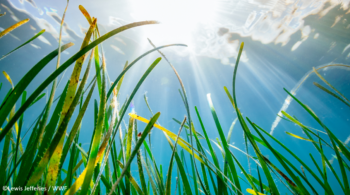Competition: Innovation in Water Challenge
Amount awarded: £249,791
Led by: Affinity Water
Partners: Anglian Water Services Ltd, Cefas (Centre for Environment, Fisheries and Aquaculture Science), Department of Zoology and Wadham College, University of Oxford, Environment Agency, Natural England, Project Seagrass, Salix River & Wetland Services Limited, Swansea University and University of Essex
Project completed: March 2024
Water cycle tag: Seas, beaches, atmosphere, climate
The Seagrass Seeds of Recovery project will provide a blueprint for restoring seagrass in the UK, creating opportunities to improve biodiversity and reduce carbon and nitrogen. Seagrass meadows enhance the stability of the coastal zone, locking carbon into the seabed, improving water quality, and creating a habitat for small animals, which enhances the resilience of coastal ecosystems. The project will provide a road map to unlock the ‘blue carbon’ potential (carbon captured by marine ecosystems) of seagrass restoration for the water industry and beyond.
Recent estimates suggest that seagrass loss in the UK may be as high as 92%. In the Essex and Suffolk areas thousands of hectares of seagrass have been lost. In the 1970s at least 380 hectares (≈380 football pitches) of seagrass could be found in the Stour and Orwell Estuaries which has all but disappeared today. These 380 hectares would have once supplied over £20 million pounds worth of denitrification and nitrogen burial services, stored over 41,000 tonnes of carbon, harboured 4.6x the abundance of fish, and increased the strength of coastal sediments by up to tenfold and substantially increasing coastal resilience during extreme weather events.
This project goes beyond simple restoration to create blue carbon frameworks to finance roll out at scale within the water industry and beyond. Carbon offsets for ‘blue carbon’ would be a new opportunity for the UK. Progress on policy to aid the development of a blue carbon finance framework (equivalent to the Woodland Code) would enable carbon credits to be issued, which would fund further restoration activities. There is presently huge demand for this with businesses and industries looking to move beyond tree planting. Investment in a blue carbon framework will help unlock this possibility for the water sector in the UK and internationally.


